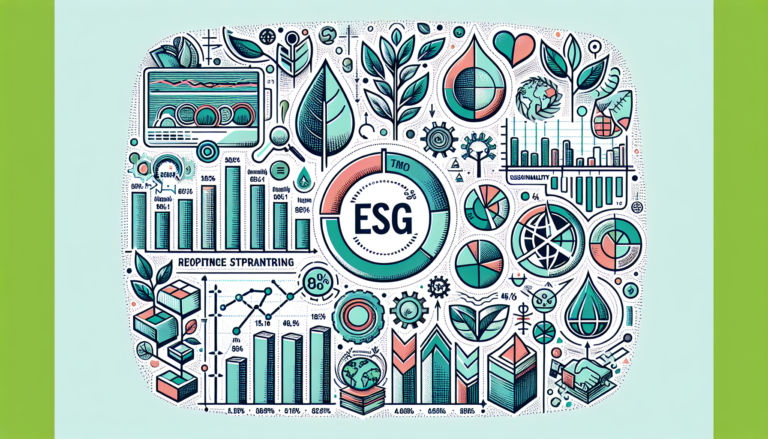What to know about sustainable esg investment funds
ESG investment funds focus on environmental, social, and governance criteria to drive sustainable investing, enhance financial performance, and align investor values with responsible business practices.
ESG investment funds have become increasingly popular, emphasizing sustainability and ethical practices. But what does that mean for investors like you? Let’s dive into the essentials!
Understanding ESG and its significance
Understanding ESG involves looking at three key areas: Environmental, Social, and Governance criteria. These criteria help investors assess how companies manage risks and opportunities related to environmental and social factors.
Environmental criteria consider how a company performs as a steward of nature. This includes how it manages waste, its energy usage, and its overall impact on the climate. Companies that focus on sustainability often see long-term benefits.
Social criteria examine how it manages relationships with employees, suppliers, customers, and the communities where it operates. Companies that prioritize social responsibility tend to attract and retain talent better and enjoy customer loyalty.
Governance criteria deal with a company’s leadership, executive pay, audits, internal controls, and shareholder rights. Investors want to back companies that practice transparency and ethics in their business practices.
Investing with ESG criteria in mind allows investors to align their values with their financial goals. There is a growing recognition that ESG investments can lead to improved company performance, making it a vital consideration for modern investors.
The rise of sustainable investing
The rise of sustainable investing has been significant in recent years. More investors are recognizing the importance of aligning their financial goals with their values. Sustainable investing focuses on companies that prioritize environmental, social, and governance (ESG) practices.
Today’s investors are not just looking for financial returns; they also want to support businesses that make a positive impact on the world. As a result, many funds are incorporating ESG criteria into their investment strategies. This shift reflects a growing awareness of how business practices can affect both society and the environment.
Many studies suggest that sustainable investments can perform as well or even better than traditional investments. Investors are increasingly valuing transparency and responsibility in the companies they support. As more data becomes available about the benefits of sustainable investing, it’s clear that investors see real value beyond profits.
Additionally, social movements and consumer preferences are driving companies to adopt more sustainable practices. This trend creates a feedback loop where businesses that prioritize sustainability are rewarded with customer loyalty and investment, further reinforcing the importance of this investment approach.
In conclusion, the rise of sustainable investing is reshaping the investment landscape. By focusing on ESG factors, investors are not only seeking competitive returns but also fostering a more sustainable future for all.
Key components of ESG investment funds
Key components of ESG investment funds include various criteria that help investors evaluate the sustainability and ethical impact of their investments. These components are essential for understanding the overall value and responsibility of a fund.
Environmental criteria assess a company’s impact on the planet. This includes its carbon footprint, waste management, and resource use. Investors often look for companies that aim to reduce their environmental impact.
Social criteria evaluate how a company manages relationships with stakeholders, including employees, customers, and communities. This may involve examining labor practices, community engagement, and customer satisfaction. Funds that prioritize social factors tend to invest in companies that treat their employees well and engage positively with society.
Governance criteria focus on the leadership and management of a company. This includes board diversity, executive compensation, and shareholder rights. Good governance ensures that companies are accountable to their shareholders and the broader community.
Additionally, risk management plays a critical role in ESG investment funds. Funds that effectively identify and manage risks related to ESG factors often have better long-term performance.
Investors interested in ESG funds should also consider transparency and reporting standards. Funds that provide clear and regular updates on their ESG practices can enhance trust and attract more investment.
How to evaluate ESG funds
Evaluating ESG funds requires careful analysis to ensure they align with your investment goals and values. Here are some key factors to consider when analyzing these funds.
1. Understand the criteria: Start by reviewing the environmental, social, and governance criteria that the fund uses. Each fund may prioritize different aspects of ESG, so it’s important to know what is most relevant to your values.
2. Review performance metrics: Analyze how the fund has performed historically compared to its peers and standard benchmarks. Look for consistent returns over time and examine any associated risks.
3. Read the fund’s prospectus: The prospectus provides vital information about the fund’s strategy, fees, and specific holdings. This document will also indicate how the fund integrates ESG factors into its investment decisions.
4. Check for transparency: Look for funds that regularly report on their ESG performance. Transparency in how they measure and report their impact is a sign of a trustworthy fund.
5. Consider third-party ratings: Third-party rating agencies often provide ESG ratings for funds. These ratings can help you gauge how well the fund is performing relative to others in the market.
6. Review fees: Assess the fees associated with the fund, including management fees and other costs. High fees can eat into your returns, so it’s essential to balance fees with performance and impact.
7. Stay updated: ESG trends are evolving, so stay informed about changes in regulations, market dynamics, and emerging sustainable practices. This knowledge will help ensure your investments remain aligned with your values.
The impact of ESG investments on performance
The impact of ESG investments on performance has gained significant attention from investors and analysts alike. Many studies indicate that incorporating ESG factors can lead to better financial outcomes.
1. Financial Performance: Many ESG investments have shown that they can perform as well, if not better, than traditional investments. Research suggests that companies with strong ESG practices often experience lower risks, which can enhance their overall performance.
2. Risk Mitigation: Companies that prioritize sustainability and social responsibility typically face fewer legal and regulatory issues. This proactive approach in managing risks can protect investments and lead to more stable returns.
3. Market Demand: There is a growing demand for ethically responsible products and services. Companies that align with these values may capture more market share, ultimately benefiting their stock prices and giving investors positive returns.
4. Long-term Growth: ESG investments often focus on long-term sustainability rather than short-term gains. This long-term perspective can lead investors to realize more significant benefits over time, promoting steady growth.
5. Investor Preferences: Many investors, particularly millennials, prefer to invest in companies that demonstrate social and environmental responsibility. This shift in preference can drive more capital towards ESG-compliant companies, enhancing their market performance.
6. Diversification Benefits: Including ESG investments can provide diversification for a portfolio. By spreading risk across different asset classes and strategies, investors may achieve more balanced and resilient portfolios.
Future trends in ESG investment
Future trends in ESG investment are set to shape the financial landscape as awareness of sustainability and social responsibility continues to grow. Here are several key emerging trends to watch for:
1. Increased Regulation: Governments worldwide are introducing stricter regulations concerning ESG disclosures. This is expected to enhance transparency and accountability among companies, making it easier for investors to evaluate and select sustainable investments.
2. Focus on Diversity and Inclusion: Investors are paying more attention to the diversity and inclusion practices of companies. Funds with strong diversity metrics are likely to attract more capital as investors seek to support businesses that reflect their values.
3. Integration of ESG in Investment Strategies: More investors will look to integrate ESG factors directly into their investment strategies. This means that financial performance will increasingly depend on a company’s sustainability profile.
4. Technology and Data Analytics: Advancements in technology and data analytics are improving the ability to measure and report ESG performance. More tools and platforms are becoming available to help investors analyze ESG metrics effectively.
5. Growth of Impact Investing: Impact investing, where funds are allocated to projects that aim to create positive social and environmental impacts, is on the rise. Investors are looking for measurable outcomes alongside financial returns.
6. Greater Emphasis on Climate Change: Climate change concerns are leading investors to prioritize funds that address environmental impacts. Companies demonstrating strong climate resilience are expected to gain investor favor.
7. Rise of Green Bonds: The issuance of green bonds is expected to grow as more companies seek to finance environmentally friendly projects. These bonds offer investors a way to support sustainable initiatives while earning returns.
In summary, the future of ESG investments is bright
As investors increasingly seek to align their portfolios with their values, the focus on environmental, social, and governance factors will continue to grow. This shift signifies a deeper understanding that financial performance and responsible investing can go hand in hand.
With trends such as stricter regulations, increased emphasis on diversity, and the rise of green bonds, the ESG landscape is changing rapidly. Investors can expect more accountability and transparency as companies adapt to these new expectations.
By staying informed about these developments, investors can make better choices for their portfolios while contributing to a sustainable future. The integration of ESG criteria represents not just a trend, but a transformative shift in how we view investments.
People also ask
What are ESG investments?
ESG investments focus on environmental, social, and governance factors to evaluate the sustainability and ethical impact of an investment.
How do I evaluate ESG funds?
To evaluate ESG funds, consider their criteria, performance metrics, fees, transparency, and third-party ratings.
What is the impact of ESG investments on financial performance?
Many studies show that ESG investments can perform as well or better than traditional investments, often due to enhanced risk management.
What are some future trends in ESG investments?
Future trends include increased regulation, a focus on diversity and inclusion, and the growth of impact investing and green bonds.
Why is transparency important in ESG investing?
Transparency helps investors understand how companies measure their ESG impact, building trust and ensuring accountability.
How can I start investing in ESG funds?
Begin by researching available ESG funds, evaluating their strategies, and consulting with a financial advisor for personalized guidance.






